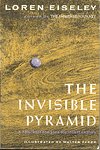

Cliquer sur une vignette pour aller sur Google Books.
|
Chargement... The Invisible Pyramid (1970)par Loren Eiseley
 Aucun Actuellement, il n'y a pas de discussions au sujet de ce livre.   ) )Thanks for the recommendation. I found myself really relating to his almost casual style of thought exploration, and despite some reservations I had with his admiration for Francis Bacon I found myself unable to essentially disagree with anything he said. He has a bravery to try to objectively consider ideas that conflict with his personal prejudices, like the possibility that there is an innate human drive to consume the planet until no option remains but escape to outer space. After a long discussion of this possibility and its implications, he concludes that our destructiveness is not innate as demonstrated by our four million years of hunting and gathering. He distinguishes this long experience of our "first world" of nature from our more recent immersion in the "second world" of culture. Complex agricultural society plunged us exclusively into this second world, enabling us for the first time to observe nature with the detachment that would give rise to modern science, the "invisible pyramid." (p.87) Before that, earlier civilizations devoted similar attention and energy to the construction of the real pyramids which memorialized their belief that the second world is of primary importance. We, the "world eaters," continue to manifest this now demonstrably mistaken belief in our current society as we gobble up every non-renewable resource as fast as we can. Eiseley says that, propelled by modern science, we are the most aggressive society in history, that "the future has become our primary obsession." (p.105) We took to heart all of Bacon's scientific genius, but we ignored his belief that the all learning should contribute to the enlightened life. (p.69) Science, and the epistemology of any culture, pursues a comprehensive understanding of the natural world that is meaningful to us in cultural terms. While our modern science is of great value on its own terms, on a larger scale, its value is less certain. Through myth, past cultures "had achieved what modern man in his thickening shell of technology is only now seeking unsuccessfully to accomplish." (p.114) The question that arises to me is, wrapped up in these unquestionables of science and technology, is there a kind of social power that desperately needs to be questioned with at least as much vigor as the power of the state and capital? Eiseley does not break it down this way, and I suspect he would resist my doing so. He saw the hippies (contemporary to Eiseley's writing) as another manifestation of the same rejection of tradition--"Faustian hunger" (p.109)--that remains our culture's greatest pride and most lethal attribute. He is conservative because change--restlessness--is what drives the world eaters. But his conservative impulse that would be desirable in a sustainable culture seems incompatible with the task of changing our unsustainable one. This is probably the source of the resignation I detected, which bothered me a little bit throughout the work. In the end Eiseley expresses a sincere and heartfelt love for the world: we must make a "conscious reentry into the sunflower forest" (p.155) which our culture has turned into "an instrument," a "mere source of materials." (p.143) If we succeed in doing so, he imagines that we will have realized something of the "axial" values of Christ, Buddha, Confucius, and Lao-Tse. But when he associates the social tumult of the 1960s with the culture of the world eaters, he presents a real challenge to the possibility of the social revolution that is required to achieve the end he desires. aucune critique | ajouter une critique
Les autorites luxembourgeoises etaient pretes a collaborer avec l Allemagne nazie pour preserver l independance de leur pays. L occupant prefera annexer le Grand-Duche sans contrepartie. Les Luxembourgeois furent soumis a une politique de germanisation et de nazification. Alors que la Resistance a l occupant ne se mit en place que tres progressivement, certains opterent pour l accommodation, jugeant qu ils ne pouvaient rien changer aux circonstances. D autres s adapterent a l ordre nouveau, pensant obtenir des concessions. Enfin, une minorite notable s assimila totalement au peuple allemand, tel que le definissait le regime national-socialiste. Ces comportements varies evoluerent tout au long de la periode d occupation. Dans ce livre, ces annees ne sont pas abordees comme un bloc homogene, mais comme une succession de phases fort differentes." Aucune description trouvée dans une bibliothèque |
Discussion en coursAucunCouvertures populaires
 Google Books — Chargement... Google Books — Chargement...GenresClassification décimale de Melvil (CDD)901.9History and Geography History Philosophy & theoryClassification de la Bibliothèque du CongrèsÉvaluationMoyenne: (4.17) (4.17)
Est-ce vous ?Devenez un(e) auteur LibraryThing. |
||||||||||||||||||||||||||||||||||||||||||||||||||||||||||||||||||||||||||||||||||||||||||||||||||||||||||||||||||||||||||